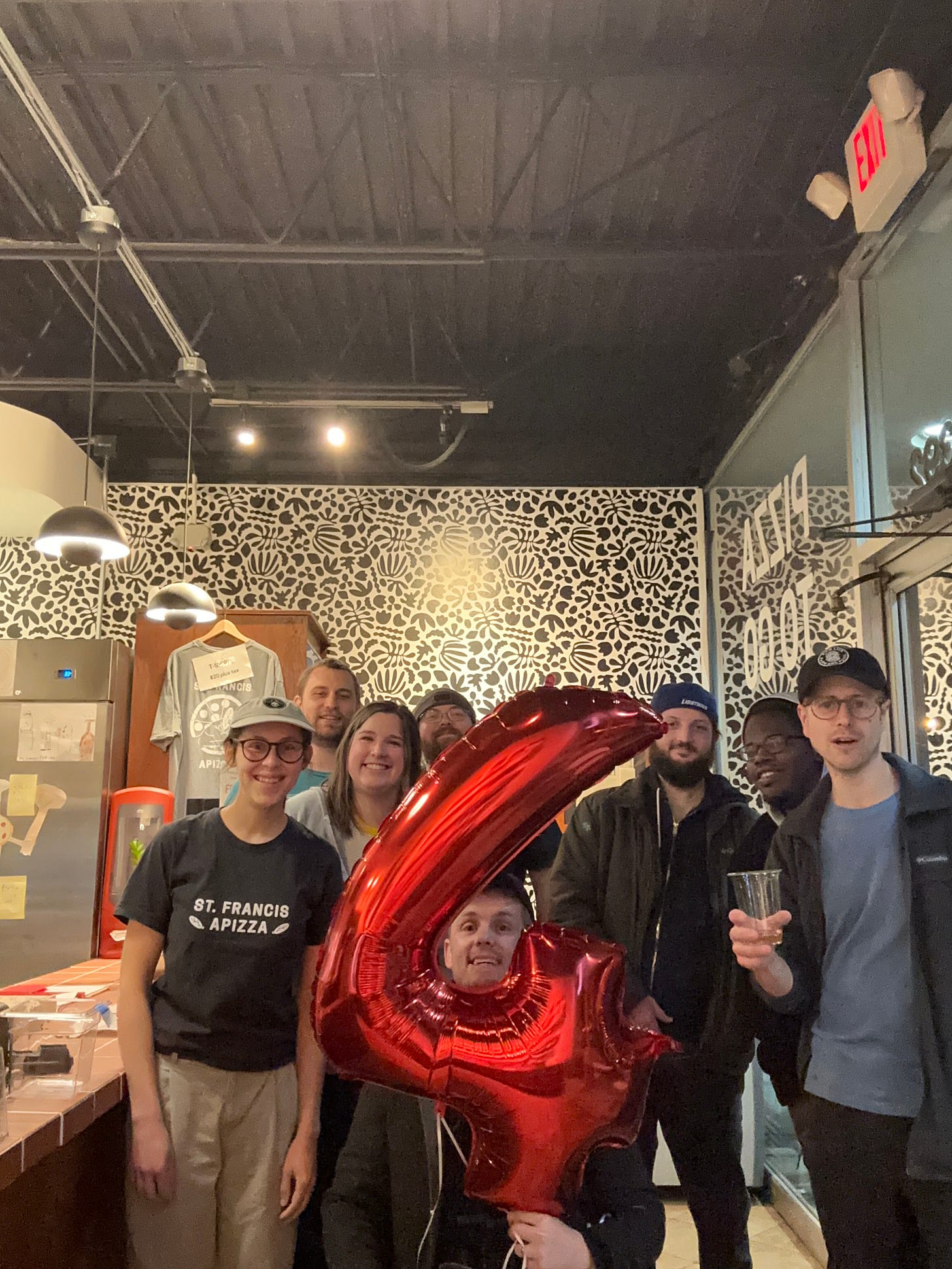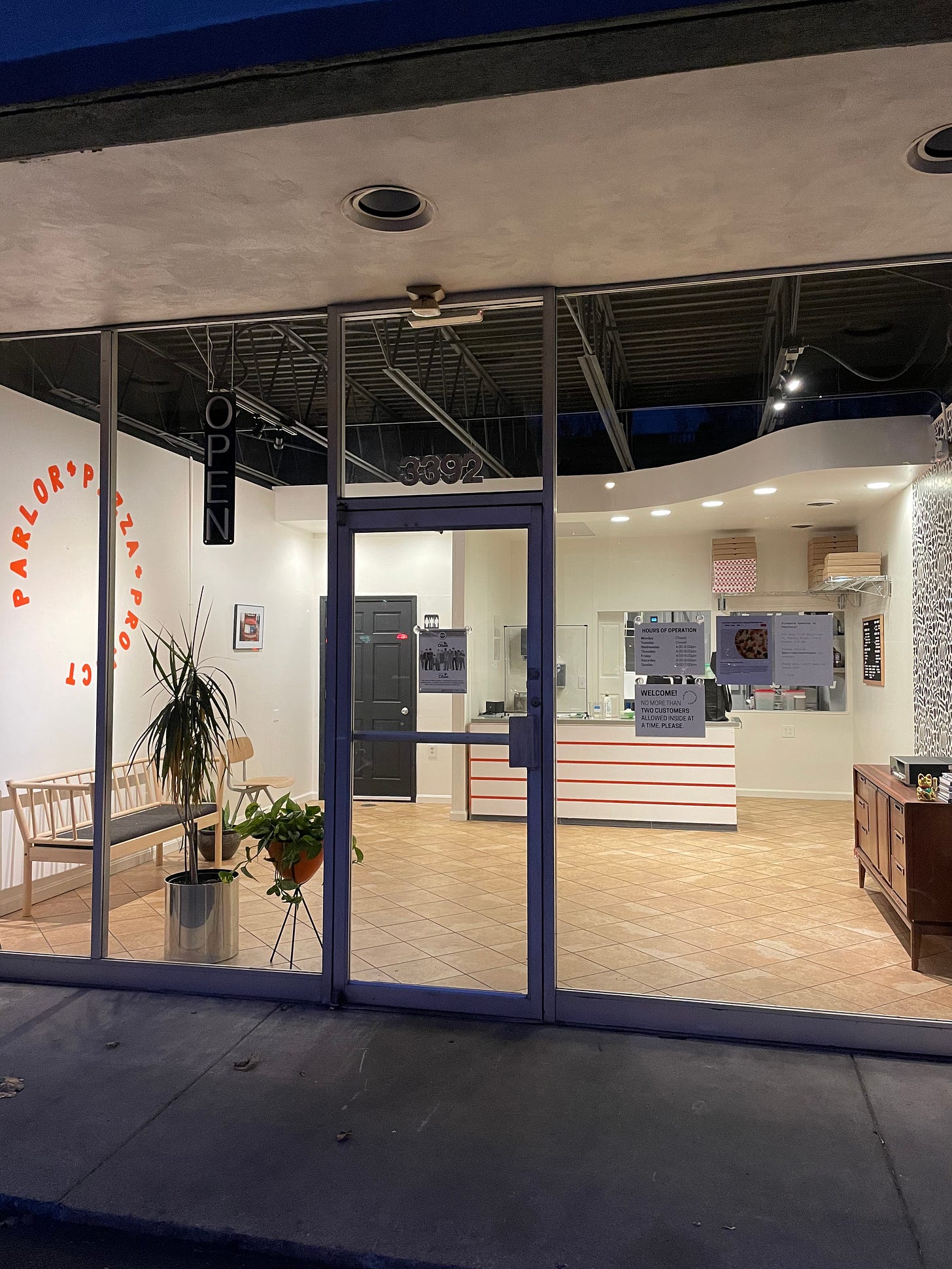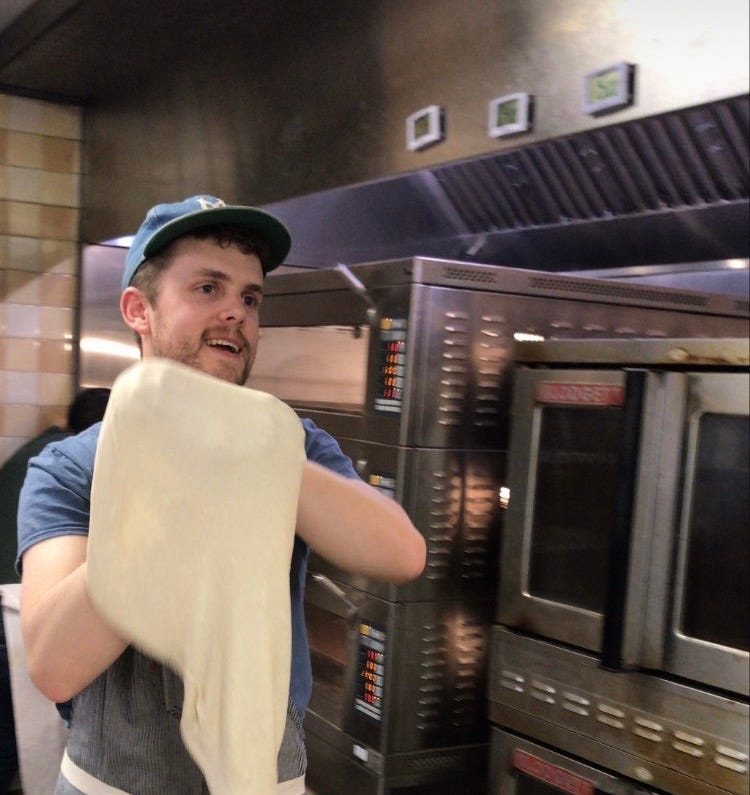“Most newsletter suck. This one doesn’t” - an anonymous real reader of this newsletter
I'm the owner of the pizza restaurant Saint Francis Apizza in Cincinnati, OH. I write a newsletter most months to send out updates about the pizzeria, share my love of pizza and the travels I embark on to learn more about my favorite food, and the business behind it.

Friday, February 21st was Saint Francis Apizza’s four-year anniversary.
That got me thinking about the early days, and what an absolute struggle but also thrill ride I/we have experienced.
I’m also working on some new projects, so carrying forward some of the things we got right the first time is top of mind.

Five mistakes I made initially, when opening Saint Francis Apizza, my takeout-only restaurant in Cincinnati’s Eats Hyde Park neighborhood.
1. I took too long to define the team culture we would aspire to
I spent some time thinking about the culture I wanted for the SFA team before we opened, but not enough. My mom is a therapist and I like to think I was raised with pretty good emotional intelligence. Still, it took me over a year to hone in on the values that were most important to me, our team, and our collective success. Nowadays we basically hire based purely on a candidate’s fit with our values, and I’m pretty sure our team would agree we have the most connected and effective group ever (very connected and very effective!). If you’re curious, those team values that took a little longer than they should’ve to define are:
Kindness
Flexibility
Contribution
2. I underestimated the importance of ‘Front of House,’ even in a takeout-only restaurant
Thankfully I hired people like Jimmy (customers in our first year + will undoubtedly remember him) and then Eric, our FOH Lead who’s been with us for coming up on three years and who has helped us meaningfully connect with tens of thousands of customers since taking over for Jimmy. I can’t imagine running this business without natural ‘hospitalitarians’ like them. Early on though, I was so focused on the pizza recipes and processes that I didn’t realize how critical customer service would be. I also briefly fell for a lot of the BS on social media — ways of doing business that repel me, especially the ‘if you don’t like it, go somewhere else’ attitude that was en vogue around the time we opened. Nowadays I recoil from any semblance of that attitude, and I cringe remembering times when I failed to lead by example in different customer services situations with our staff. I had to work extra hard to rebuild our standards about how we respond to customer complaints, unusual requests, etc., and communicate more intentionally about the why behind our more enlightened, kind response. We are in a much better space today as our culture is now defined and permeates our day to day work (see Mistake #1).
3. Thinking too small
Dan Richer of Razza gave me two pieces of advice when I met him in 2020: 1) when creating your pizza dough recipe, start with the best baguette recipe you can find. 2) get the biggest oven you can afford because if your dough recipe is good, you’re going to need a big oven very quickly. I guess I did follow his advice, because I did buy the biggest oven I could afford, but I wish I’d saved up more because this was a limiting factor within a few months of opening. We eventually added a second oven but that only helped so much. We still need more oven space to completely eliminate those hour + waits you see from us on Fridays, Saturdays, and Sundays during football season. I could replace both with our ideal oven, but the total cost is much more than it would’ve been had a bit the bullet in the first place.
4. Not doing a quality trademark search.
I’m not going to retell the whole story here, but in short, I underestimated the lengths that some will go to defend a trademark! I ultimately hired a trademark lawyer to help me with this, after the initial snafu. Fortunately, we emerged from our name-changing fiasco unscathed, but my hair went another shade of gray during this time, which of course also coincided with the 24/7 stressors of getting a restaurant off the ground.
5. I was unprepared for how much the stress of owning a business would rock my world.
I wouldn’t trade it for anything. Still, I’ll never forget what my friend Stephanie, a more experienced business owner and mentor to me, told me before I signed the lease on our pizzeria: “Your business will always be with you. It will always be in the back of your mind, no matter what you’re doing.” She was right. Life before and after the pizzeria is completely different. The reason? To varying degrees, depending on the day, it is always in the back of mind that this could all crumble. It may sound crazy to you, but I have confided this in those closest to me: the outcome of the business I started can feel existential. Of course, this is alarming in a way, and changing my relationship with it is something I’m working on literally every day. At the same time, does anything meaningful get created without true passion? The important thing is nurturing the passion for my work, and managing the fear that creeps into center stage. I’ve asked so many business owners how they cope with stress, fear, and all the other looming emotions that, almost like rust, can slowly erode us. I will tell you this: I’ve never met a business owner who was confused by the question.

Four sound decisions I made before opening our pizzeria, and/or in the ‘early days’
1. I planned cautiously, down to the dollar
I built a spreadsheet using simple unit economics, and based top-line sales projections on a conservative number of pizzas I expected to sell. In other words, I didn’t ask ‘How big could this be?’, I asked, ‘What’s the minimum number of pizzas I have to sell to be able to live my dream?’ Then I budgeted my costs, especially the big ticket ones like our rent and the number of people I could hire, based on those low sales estimates. I knew that if sales increased, I could then afford to add on in different ways. You can see how this approach is in tension with the third ‘Mistake I Made’, above: ‘Thinking Too Small.’
I also planned myself into the labor budget (in other words, I helped keep costs down for the first year + by working 6-7 days a week). I knew exactly what sales numbers we had to hit and maintain before I could ‘replace myself.’ And while I wasn’t any less present for our team, I was able to pay someone else to work when I couldn’t be there, and to free me up to work on some bigger picture matters (see my first ‘Initial Mistake’). The other part of this is that I made sure I knew how to work every position in the business, and just as importantly, set the expectation that I would, not just warned myself that I might have to. Even if you decide to take on debt, forecast exactly how much you’ll be paying back, and when it will happen.
2. I travelled, studied, and worked like it was my job.
My wife and I were both teachers when my pizzeria dream got serious. We had a tight budget. But we spent all the money we could traveling to places like New York (duh), San Francisco (Tartine), Phoenix (Pizzeria Bianco) to see what was out there. I also met many of the brilliant, dedicated pizza makers who advised me along the way. I even paid the person whom I identified as the greatest pizza maker and one-location pizzeria owner in the US to let me shadow him and ask every question I could think of. We agreed on total transparency, and I got to see for myself how he spent his time every day, his business’ P&Ls, kitchen processes, everything. What this did for me was created a framework, an example to start with before making it my own. This was probably the best money I ever spent.
Finally, I got a job making sourdough breads five days a week. I was the only full-time bread baker on staff, so I had the opportunity to be solely responsible for the entire process, from managing starters and mixing dough, to baking off the bread and placing it on the retail shelf. At first, it was like a high-school freshman in a PhD program. But because my hands alone touched every part of the process, I could measure my progress. If the bread came out the way I intended, I knew exactly why. And all the times it didn’t, I could learn from those, too.
An unplanned but helpful consequence of working at that bakery was also that the business owner was wonderful to work for. She set an example that I continue to draw from. The way I looked at it, working at an excellent bakery or pizzeria was like being in school for my future…that someone paid me to undergo!
3. I hired people who are great at their job, and who are a pleasure to be around.
RC Buford of the San Antonio Spurs, the highly successful NBA franchise with a legendarily strong professional culture, was asked what makes a great team like the Spurs, from the front office to the players on the court. He said something along the lines of ‘Hire people who are great at their job, and who are a pleasure to be around. It’s that simple.’
One of the first and most important hires I made is now our Kitchen Manager, four years later. We have a working relationship we’re both proud of, and she has been able to continually grow into her role. The reason I hired her was because we worked together for about a month when I first moved back to Cincinnati in 2020, before opening SFA. At the restaurant where we worked, there were a lot of people working at any given time, but she was the person I asked to help me or answer a question when I didn’t know how to do something the way that the restaurant wanted. When she applied, it was obvious to me that someone I naturally wanted to ask questions of and learn from would be great to work with. As I wrote in ‘Mistake 1,’ it took me longer than it should have to sit down and actually define the values underpinning the culture of our team, that would inform our hiring and promotion decisions, etc. Thankfully, even when it was mostly an intuitive process, I have hired people who are a pleasure to be around and great at their jobs.
4. I kept my focus, and our focus, on the most important things.
Not getting distracted has been a struggle, and something I still have to actively manage. Similar to defining our cultural values, paring down our value proposition took some time. Getting as focused as possible, there are two business focuses that matter most:
the pizza is consistently excellent
we get the pizza to our customers through friendly and efficient service
I don’t mind when someone on our team or a customer suggests something new or outside our core business focus. My all-over-the-place brain is without a doubt the biggest source of my own distraction. Garlic knots, TikTok, a new phone system, to name a few from the past couple months. But it is front of mind for me that nothing can get in the way of or distract us from the most important things, no matter what. Does this idea help us make more consistently excellent pizza or provide better service? If not, it might still be important, but they’re going to find their way to the bottom of our collective to-do list.
Thank you for reading, and thank you for trusting us with your pizza needs!
There is no charge for this newsletter, but if you’re hungry, we’ll make you a pizza tonight, tomorrow, or any night…
- Alex Plattner, Saint Francis Apizza
saintfrancisapizza@gmail.com


